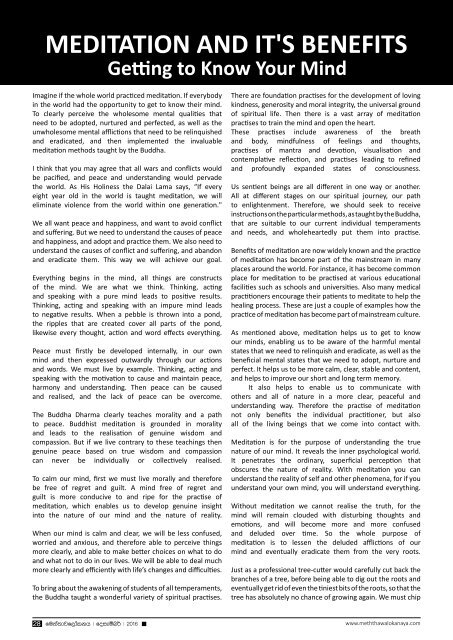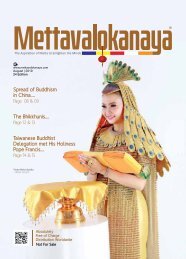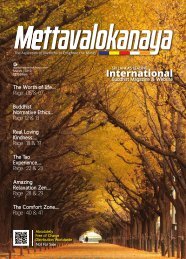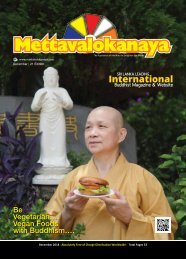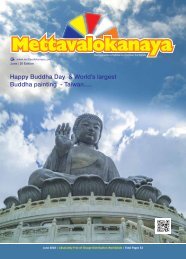Mettavalokanaya_Magazine_December_2016
“Mettavalokanaya” International Buddhist Magazine has been successfully distributed to 40 countries including all districts across Sri Lanka and now “Mettavalokanaya” is Sri Lankan Most Popular & Leading monthly Buddhist Magazine.
“Mettavalokanaya” International Buddhist Magazine has been successfully distributed to 40 countries including all districts across Sri Lanka and now “Mettavalokanaya” is Sri Lankan Most Popular & Leading monthly Buddhist Magazine.
You also want an ePaper? Increase the reach of your titles
YUMPU automatically turns print PDFs into web optimized ePapers that Google loves.
MEDITATION AND IT'S BENEFITS<br />
Getting to Know Your Mind<br />
Imagine if the whole world practiced meditation. If everybody<br />
in the world had the opportunity to get to know their mind.<br />
To clearly perceive the wholesome mental qualities that<br />
need to be adopted, nurtured and perfected, as well as the<br />
unwholesome mental afflictions that need to be relinquished<br />
and eradicated, and then implemented the invaluable<br />
meditation methods taught by the Buddha.<br />
I think that you may agree that all wars and conflicts would<br />
be pacified, and peace and understanding would pervade<br />
the world. As His Holiness the Dalai Lama says, “If every<br />
eight year old in the world is taught meditation, we will<br />
eliminate violence from the world within one generation."<br />
We all want peace and happiness, and want to avoid conflict<br />
and suffering. But we need to understand the causes of peace<br />
and happiness, and adopt and practice them. We also need to<br />
understand the causes of conflict and suffering, and abandon<br />
and eradicate them. This way we will achieve our goal.<br />
Everything begins in the mind, all things are constructs<br />
of the mind. We are what we think. Thinking, acting<br />
and speaking with a pure mind leads to positive results.<br />
Thinking, acting and speaking with an impure mind leads<br />
to negative results. When a pebble is thrown into a pond,<br />
the ripples that are created cover all parts of the pond,<br />
likewise every thought, action and word effects everything.<br />
Peace must firstly be developed internally, in our own<br />
mind and then expressed outwardly through our actions<br />
and words. We must live by example. Thinking, acting and<br />
speaking with the motivation to cause and maintain peace,<br />
harmony and understanding. Then peace can be caused<br />
and realised, and the lack of peace can be overcome.<br />
The Buddha Dharma clearly teaches morality and a path<br />
to peace. Buddhist meditation is grounded in morality<br />
and leads to the realisation of genuine wisdom and<br />
compassion. But if we live contrary to these teachings then<br />
genuine peace based on true wisdom and compassion<br />
can never be individually or collectively realised.<br />
To calm our mind, first we must live morally and therefore<br />
be free of regret and guilt. A mind free of regret and<br />
guilt is more conducive to and ripe for the practise of<br />
meditation, which enables us to develop genuine insight<br />
into the nature of our mind and the nature of reality.<br />
When our mind is calm and clear, we will be less confused,<br />
worried and anxious, and therefore able to perceive things<br />
more clearly, and able to make better choices on what to do<br />
and what not to do in our lives. We will be able to deal much<br />
more clearly and efficiently with life’s changes and difficulties.<br />
To bring about the awakening of students of all temperaments,<br />
the Buddha taught a wonderful variety of spiritual practises.<br />
There are foundation practises for the development of loving<br />
kindness, generosity and moral integrity, the universal ground<br />
of spiritual life. Then there is a vast array of meditation<br />
practises to train the mind and open the heart.<br />
These practises include awareness of the breath<br />
and body, mindfulness of feelings and thoughts,<br />
practises of mantra and devotion, visualisation and<br />
contemplative reflection, and practises leading to refined<br />
and profoundly expanded states of consciousness.<br />
Us sentient beings are all different in one way or another.<br />
All at different stages on our spiritual journey, our path<br />
to enlightenment. Therefore, we should seek to receive<br />
instructions on the particular methods, as taught by the Buddha,<br />
that are suitable to our current individual temperaments<br />
and needs, and wholeheartedly put them into practise.<br />
Benefits of meditation are now widely known and the practice<br />
of meditation has become part of the mainstream in many<br />
places around the world. For instance, it has become common<br />
place for meditation to be practised at various educational<br />
facilities such as schools and universities. Also many medical<br />
practitioners encourage their patients to meditate to help the<br />
healing process. These are just a couple of examples how the<br />
practice of meditation has become part of mainstream culture.<br />
As mentioned above, meditation helps us to get to know<br />
our minds, enabling us to be aware of the harmful mental<br />
states that we need to relinquish and eradicate, as well as the<br />
beneficial mental states that we need to adopt, nurture and<br />
perfect. It helps us to be more calm, clear, stable and content,<br />
and helps to improve our short and long term memory.<br />
It also helps to enable us to communicate with<br />
others and all of nature in a more clear, peaceful and<br />
understanding way. Therefore the practise of meditation<br />
not only benefits the individual practitioner, but also<br />
all of the living beings that we come into contact with.<br />
Meditation is for the purpose of understanding the true<br />
nature of our mind. It reveals the inner psychological world.<br />
It penetrates the ordinary, superficial perception that<br />
obscures the nature of reality. With meditation you can<br />
understand the reality of self and other phenomena, for if you<br />
understand your own mind, you will understand everything.<br />
Without meditation we cannot realise the truth, for the<br />
mind will remain clouded with disturbing thoughts and<br />
emotions, and will become more and more confused<br />
and deluded over time. So the whole purpose of<br />
meditation is to lessen the deluded afflictions of our<br />
mind and eventually eradicate them from the very roots.<br />
Just as a professional tree-cutter would carefully cut back the<br />
branches of a tree, before being able to dig out the roots and<br />
eventually get rid of even the tiniest bits of the roots, so that the<br />
tree has absolutely no chance of growing again. We must chip<br />
28 fu;a;djf,dalkh I foieïn¾ I <strong>2016</strong><br />
www.meththawalokanaya.com


